Do I still need a content manager with AI?

A subscription to ChatGPT costs from $20 per month and the cost of a full-time content manager is between $3,000 and $4,500 per month.
Pretty understandable, then, that you might be wondering whether you still need a content manager anno 2024 or whether you can ask ChatGPT to write your content for you.
After all, why spend a few thousand dollars a month on a content manager when ChatGPT can do the same job?
As a content manager at Buzzlytics, I have already experimented a lot with AI tools like ChatGPT, and I have found that they can definitely help me with content writing. As such, they have now become an indispensable part of my workflow.
However, the fact that I am still writing this article myself (with a little help from AI) also indicates that AI is not (yet?) so good that it can replace a content manager.
In this article, I explain by means of examples why, despite the rise of AI, you still need a content manager. By the end of this article, you will know what the limitations of AI are and how you can then use these types of tools in the content creation process.
Why you still need a content manager
AI tools are not original or creative
Only human writers can come up with truly new and creative ideas, stories, perspectives and ways to express themselves.
And new and creative ideas are what you need to create content that sets you apart from the thirteen-in-a-dozen content the Internet has been flooded with in recent years and will continue to be flooded with in the years to come.
With this kind of content, you will never become an authority in your industry.
ChatGPT is fine at spitting out well-written text, but in the end it is "just" an AI model trained on existing data. It cannot match the originality and creativity of human writers.
AI cannot come up with anything new, so with AI-generated content you will never become an authority.
The other day I saw a post come across on LinkedIn from someone who had asked ChatGPT to write a recruiting text. ChatGPT had to use humor, imagery and metaphors. Preeminently three things people are very good at and ChatGPT is not.
The example shows well that ChatGPT is indeed not capable of this (yet?):
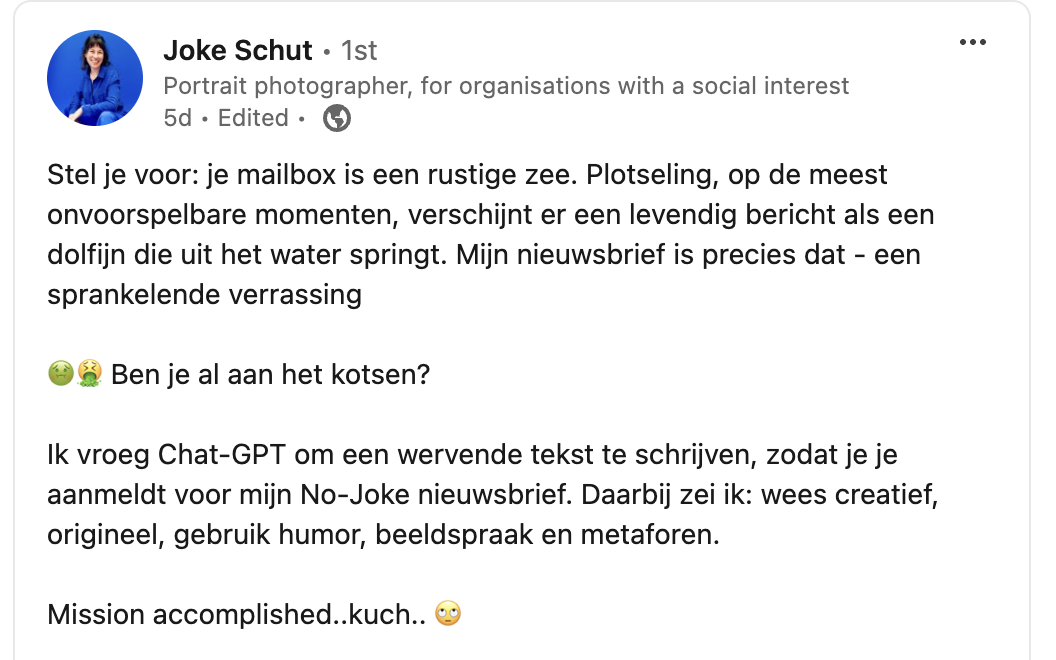
AI tools lack emotional intelligence and personal experiences
In addition, human writers often draw on their own life experiences, emotions and cultural context when writing.
Not only does this ensure that your content is unique (after all, others do not have the same experiences as you), but also that you can make a real connection with your reader. ChatGPT does not have its own experiences and emotions and therefore cannot do this.
Human writers can make a real connection with your reader.
To give an example, our They Ask, You Answer coach Lucas has been on the client's side as a CMO, so he can articulate exactly what it's like to have an experienced content manager who shoots into resistance when told to write differently:
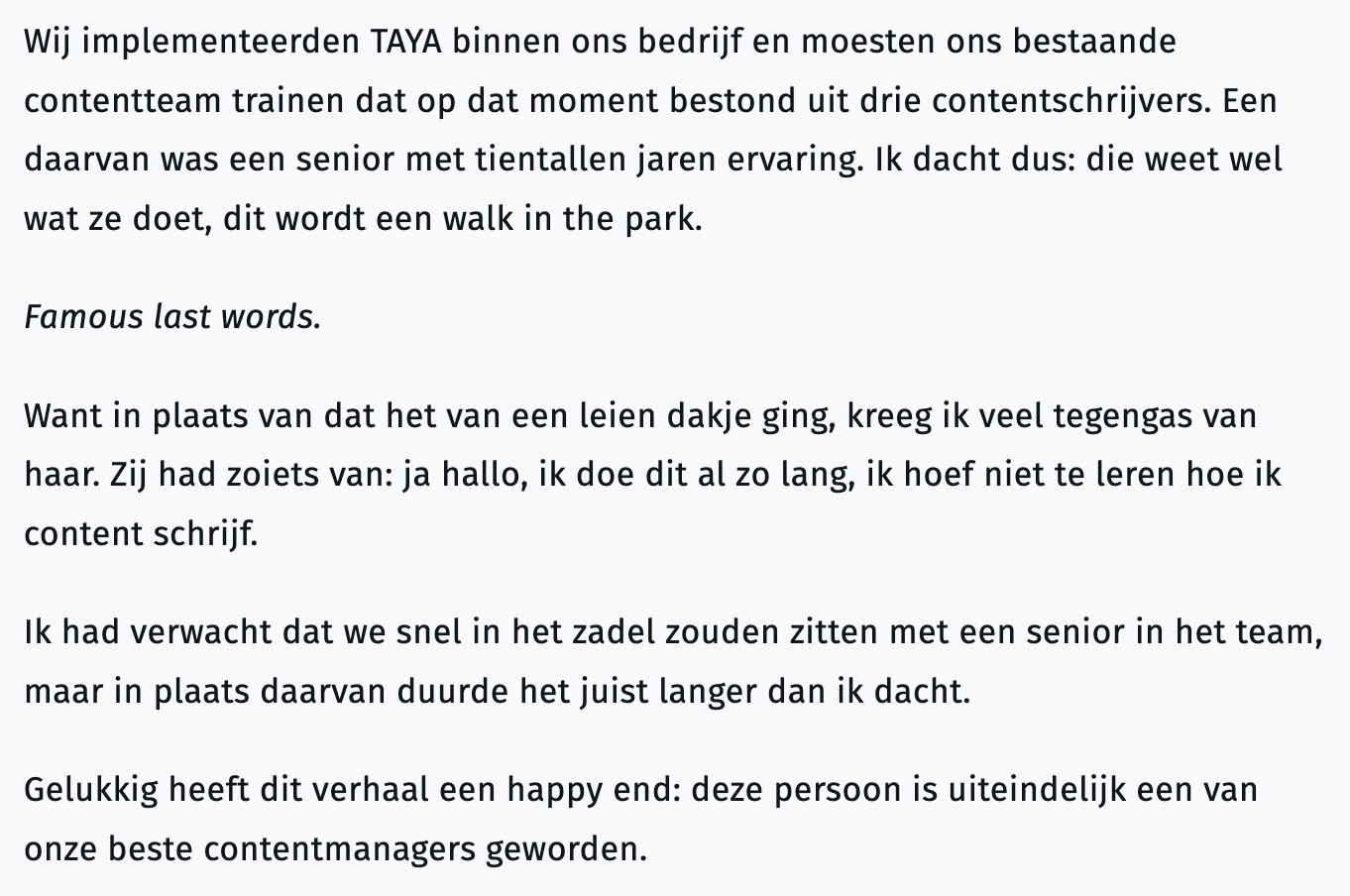
I in turn, from my role as a brand new TAYA content manager, can connect well with the experienced, offended content manager:
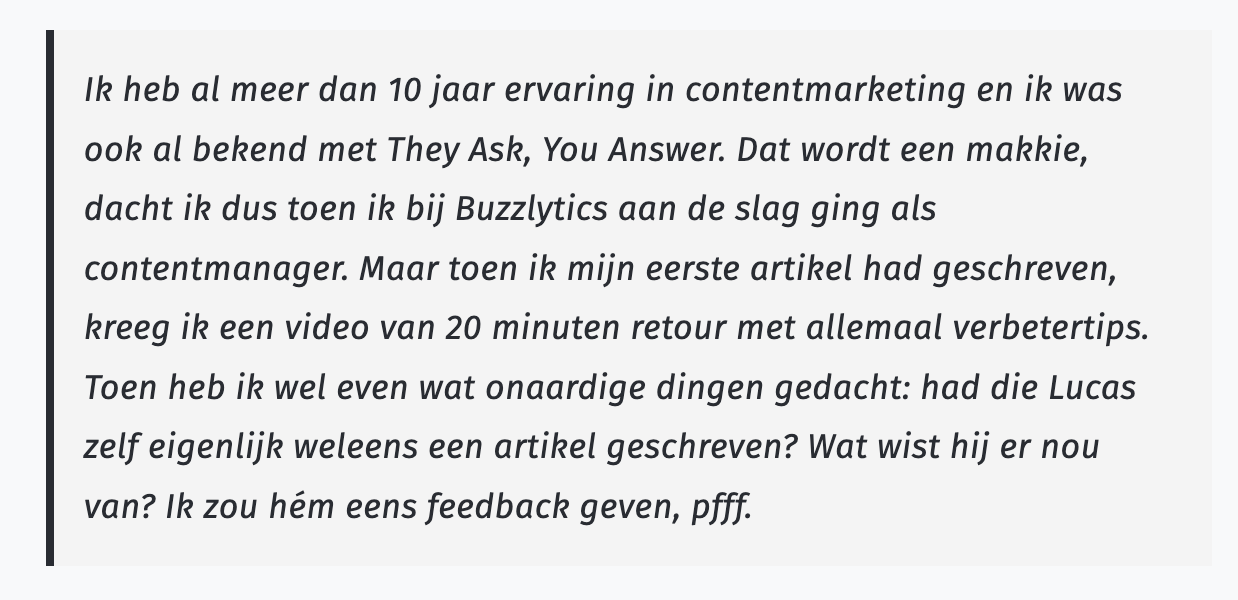
ChatGPT cannot generate these kinds of examples, because again, ChatGPT has not had these experiences.
AI tools lack nuance and contextual understanding
Third, human writers have a much deeper understanding of context, subtext, idioms, humor, sarcasm and cultural references. Texts written by humans are therefore full of these. ChatGPT may have difficulty interpreting or producing these types of texts.
This is especially noticeable in specialized fields where it is crucial to have in-depth knowledge of the context.
These examples from an Ahrefs blog post (recommended if you want to read more on this topic!) show that ChatGPT is very good at superficial content.
A roadmap for how to install macOS on a Mac? No problemo:
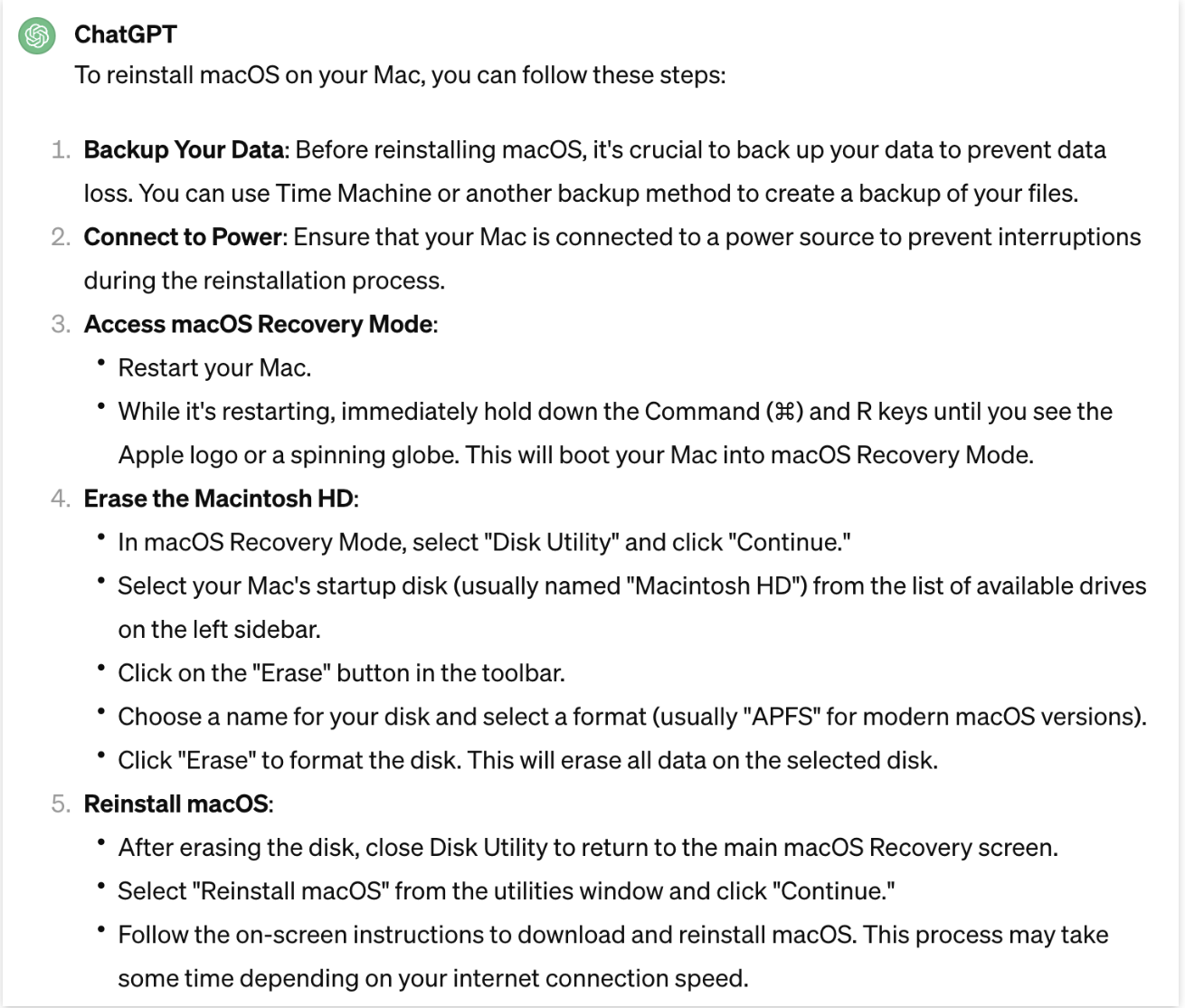
But with the question of how to conduct a content audit, it has more difficulty because this task requires in-depth, specialized knowledge:
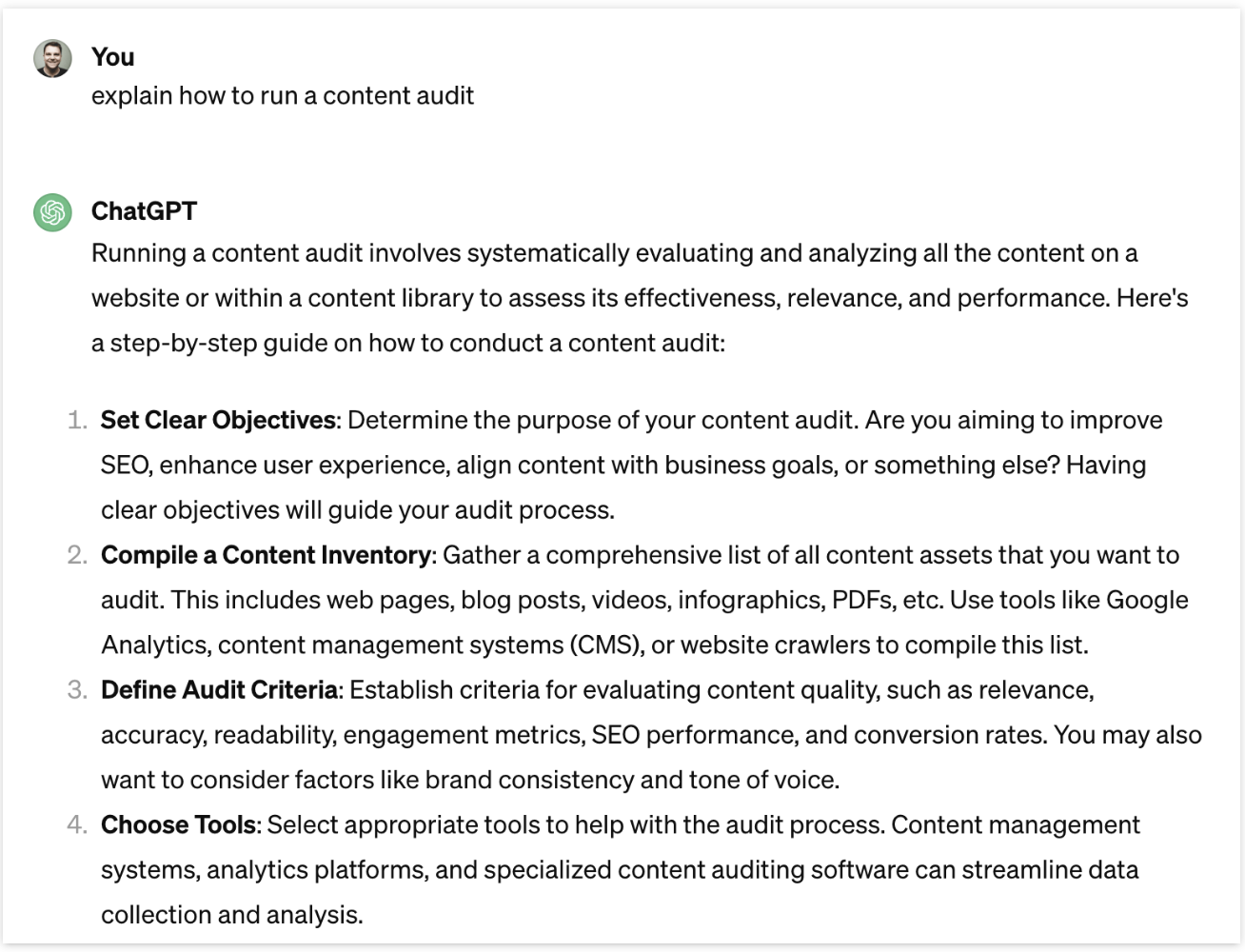
A content manager does more than just write
Finally, a text does not write itself (yet). So a content manager does much more than just write.
He also leads content brainstorms with the revenue team, for example, to pick up topics, manages the content calendar, conducts interviews, keeps published content up to date, and so on.
In theory, of course, you could put some of these kinds of tasks on another employee's plate. But then it probably won't be long before your results start to suffer because this employee has prioritized other things.
Only with a full-time content manager can you publish the two to three articles per week needed for the best results with They Ask, You Answer.
Also read: The 9 tasks of a successful content manager
The solution: a little from your content manager and a little from AI
So subscribing to ChatGPT instead of hiring a content manager is not a good idea.
But your content manager can (and should, I would add) use ChatGPT and other AI tools in his work, of course.
That way you have the best of both worlds: ChatGPT can take over, speed up, make fun or improve certain parts of the writing process, and your content manager catches ChatGPT's limitations.
Noted content marketer Ryan Law calls this AI-assisted writing. He argues that writers can use AI tools as a starting point, "using it the way skilled craftswoman uses any tool - to turn something good into something great.
So for best results, you do need a 'skilled craftswoman' (or craftsman, of course). After all, "a fool with a tool" is still "a fool.
With a combination of a content manager and AI tools, you have the best of both worlds.
As part of our TAYA Mastery program, we coach and train content managers to create content that meets the high quality standards of They Ask, You Answer. We also teach them how to use AI as a writing chassisstent.
Wondering if the TAYA Mastery track is right for your business? Then read our article Does They Ask, You Answer work for my business? or schedule a consultation with one of my certified They Ask, You Answer colleagues.
Related articles
January 28, 2025
-
Reading time: +/- 10 min
February 13, 2025
-
Reading time: +/- 7 min








